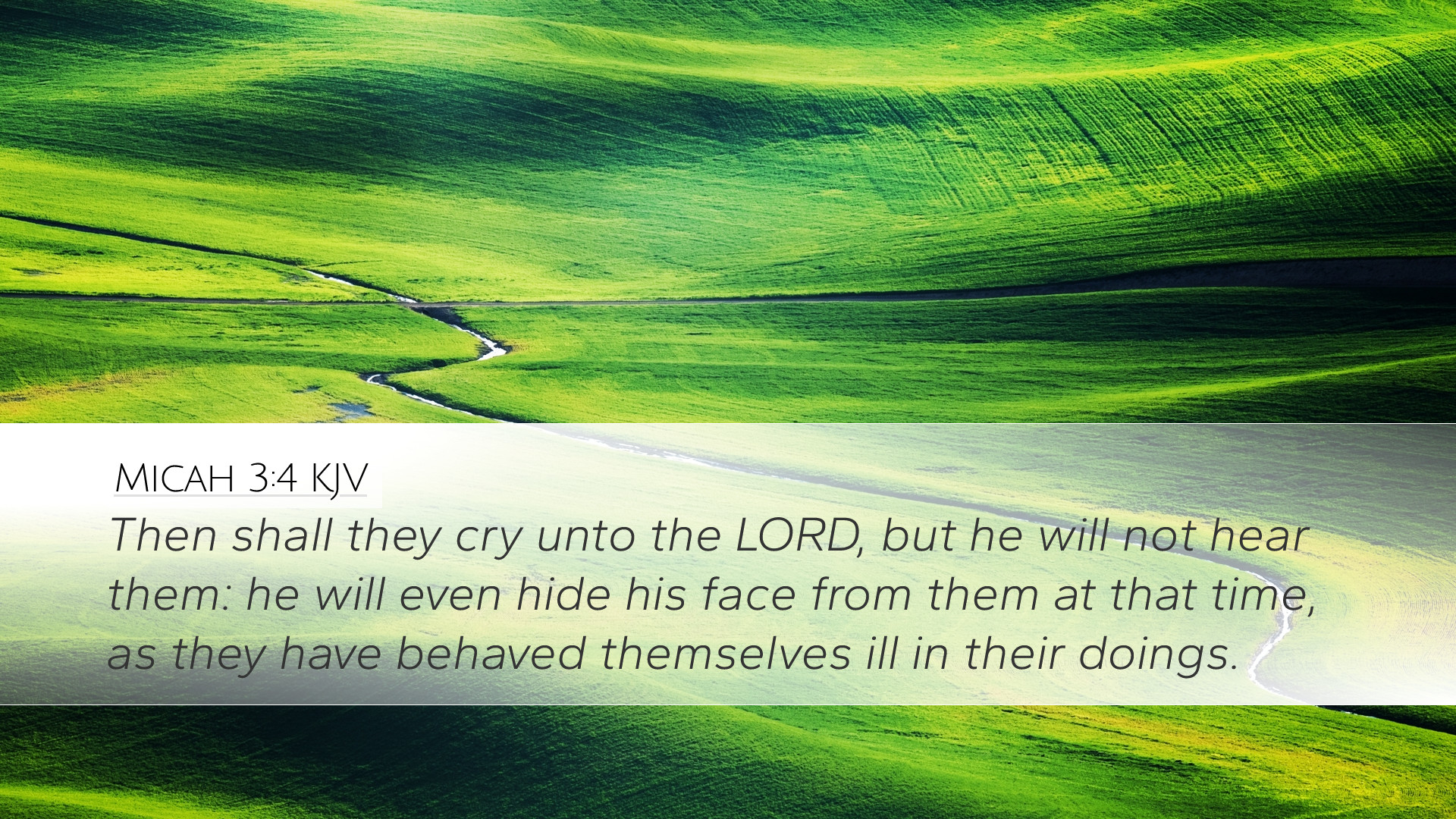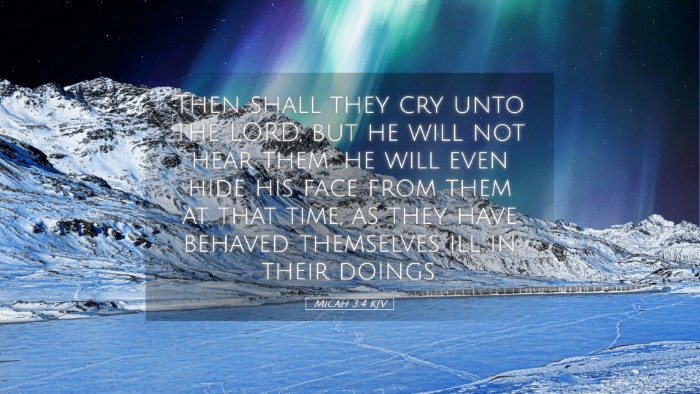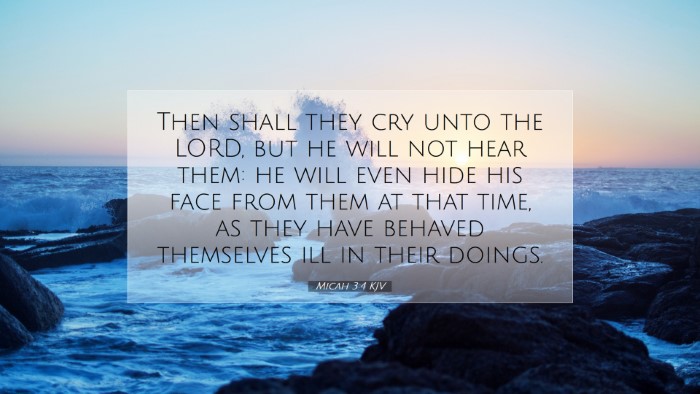Old Testament
Genesis Exodus Leviticus Numbers Deuteronomy Joshua Judges Ruth 1 Samuel 2 Samuel 1 Kings 2 Kings 1 Chronicles 2 Chronicles Ezra Nehemiah Esther Job Psalms Proverbs Ecclesiastes Song of Solomon Isaiah Jeremiah Lamentations Ezekiel Daniel Hosea Joel Amos Obadiah Jonah Micah Nahum Habakkuk Zephaniah Haggai Zechariah MalachiMicah 3:4
Micah 3:4 KJV
Then shall they cry unto the LORD, but he will not hear them: he will even hide his face from them at that time, as they have behaved themselves ill in their doings.
Micah 3:4 Bible Commentary
Micah 3:4 Commentary
Text of Micah 3:4: "Then shall they cry unto the LORD, but he will not hear them: he will even hide his face from them at that time, as they have behaved themselves ill in their doings."
Introduction
This verse encapsulates a profound warning from the prophet Micah concerning the consequences of Israel's systemic moral decay and corruption. This commentary synthesizes insights from respected public domain commentaries, providing a comprehensive examination of the verse's theological and practical implications.
Contextual Background
Micah prophesied during a tumultuous time for Israel and Judah, when injustice, idolatry, and corruption infiltrated the society. The leaders, priests, and prophets conspired to exploit the vulnerable and to pursue their own interests, thus prompting God's impending judgment.
The Consequence of Rebellion
- Divine Silence: Matthew Henry emphasizes that the silence of God in response to the cries of the rebellious signifies a judgment that is self-inflicted. The people had turned away from righteousness and thus could expect no favorable response from God in their time of need.
- Sin's Effects: Albert Barnes notes that this verse serves as a stark reminder of how iniquity separates humanity from God. The people’s wrongdoing had reached a point where their prayers and pleas were ineffectual, highlighting a God who withdraws His favor in response to persistent disobedience.
- Divine Hide: Adam Clarke points out the gravity of God hiding His face, symbolizing a complete withdrawal of divine assistance. In a cultural context where individuals relied heavily on God's presence for guidance and protection, this act represents utter spiritual desolation.
The Call to Repentance
While the tone of the verse is one of despair, it implicitly calls for introspection and repentance. The refusal of God to listen is not absolute; there lies an understanding that genuine repentance can restore fellowship.
- Repentance as Restoration: Matthew Henry elaborates that although the people would cry out in futility, this period of judgment should provoke them to seek genuine repentance. Their misbehavior should lead them to recognize their dire need for God's grace.
- Hope Remains: Although the immediate context is bleak, Barnes notes that the overarching narrative of Scripture continually points to hope and restoration. The prophets often convey that true repentance could lead to forgiveness and restoration.
Applications for Today's Readers
This verse should resonate deeply with contemporary believers, serving as a critical reminder of the nature of sin and its consequences. It implores leaders and individuals alike to reflect on their actions and their implications.
- Reflection on Conduct: Clarke posits that this scripture serves as an exhortation for self-examination, challenging believers to consider how their actions align with God's precepts.
- Intercessory Prayer: Given that the passage emphasizes God's silence toward the unrighteous, it underscores the importance of prayer that is accompanied by genuine faith and obedience.
- Consequences of Collective Sin: Micah’s message indicates that sin has communal ramifications. The integrity of leaders and the populace affects the state of the nation, serving as a warning to modern-day society about the spiritual and social consequences of moral failure.
Theological Reflection
A deeper theological reflection on Micah 3:4 reveals critical attributes of God, notably His holiness and justice. The refusal to listen during a time of crisis underscores the seriousness of sin and divine justice.
- God's Justice: Both Henry and Barnes affirm that God’s justice mandates a response to sin. His refusal to hear indicates not only displeasure but also the orderly nature of divine governance where sin cannot go unpunished.
- God’s Sovereignty: The silent withdrawal of God reflects His sovereignty in dealing with His creation. His choices establish a clear correlation between human conduct and divine response, ensuring that righteousness is ultimately upheld.
Conclusion
Micah 3:4 stands as a sobering reminder of the consequences of sin and the serious nature of a relationship with God. It calls for a lifestyle marked by righteousness and repentance rather than complacency in sin. For students, pastors, and theologians, this verse serves to inspire a deeper inquiry into the nature of God’s justice, the importance of ethical leadership, and the transformative power of genuine repentance. In reflecting on this passage, may we be stirred towards a sincere pursuit of holiness, aligning our lives more closely with the character of God.


